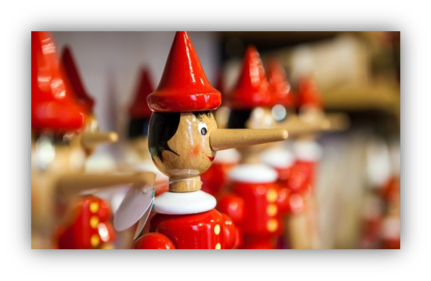I was a born fiction writer, which is to say, I was a born liar. From the time I was able to speak, I lied about everything, big and small, even if there was no good reason to lie, or when the lie was easily exposed. I told a woman at a birthday party that my mother had just given birth to twins (both girls), ten minutes before my still visibly pregnant mother showed up to take me home. I told a neighbor that we were going to California for spring vacation, even though she could clearly observe our comings-and-goings from her kitchen window. It was as if reality were a corset to be shucked off at every opportunity; I longed to breathe without its constraints, to inhale the purer air of imagination.
The biggest lie I ever told was such a whopper, I was surprised when the girl who sat next to me on the bus believed it. She was pale, and unhealthy-looking, with a country accent, and an adenoidal wheeze, and we sat together on the bus, not because we were friends, but because we recognized in one another what others recognized in us—that we were fellow rejects—her with her poverty pallor, and perpetually running nose; me with my “Chinky” eyes, and my jet black hair in a tangled nest.
I told this girl that, all evidence to the contrary, I had been born a Swedish princess, with blonde hair and icy blue eyes, and that, due to some unfortunate combination of political treachery and court intrigue, my father, the King, had had me disguised—something involving surgical intervention and cosmetology—as a Korean girl, and placed me with fake “parents,” to hide, out of sight and harm’s way, in the bucolic backwater of central Virginia.
I still remember the girl’s blinking incredulity, widening into wonder and newfound respect. It was an immensely gratifying moment, and surely the first time I had received such a positive and immediate response to my “fiction.”
So, it was disheartening when, the next morning, this same girl got on the school bus, and, instead of sitting down next to me like she usually did, scrunched up her face at me in such a look of anger and contempt that I felt physically abraded. “My mama says you’re a liar,” she said. “She said everything you told me was made-up. She’s goin’ to call your mama and tell her you’re making up stories.”
Whatever fear this might have struck in my heart, it was indignation that carried the day. The whole rest of the way to school, I fumed. Of course I knew that I wasn’t really Swedish, and that my parents were my real parents, but I wanted it to be true, and who was this girl’s mother to be so sure it wasn’t? And, anyway, why not just applaud my imagination, and not get hung up on facts?
That I wished so fervently to be other than I was, a knobby-kneed Asian girl with a sallow complexion and a bowl haircut, did not trouble me at the time. This was back when Barbie dolls only came in one flavor—vanilla. No, what troubled me was that I looked so different from all the other kids, and from the people I saw on TV, and in the movies. I was no Cinderella, no Sleeping Beauty, no Dorothy, or Mary Poppins. If you looked to popular culture, I was invisible; if you looked around my school, I was the odd one out.
I think it made my mother sad, more than anything, that I should so repudiate my own kind. She herself was a strikingly beautiful woman, with a great sense of style, and the elegance of Audrey Hepburn. All she said to me, after she got off the phone with the girl’s mother, was, “Don’t tell lies.”
I wish I could say that I heeded her advice, and it is true that I learned, more and more, to use my writing as an outlet, (for what was made up on the page was called fiction, not lies, or was somehow understood as lies, and was therefore acceptable)—but I still had some doozies up my sleeve, (that I ran away from home when I was fifteen; that I went all the way in high school), and the boundary between my snazzy embellishments, and the straight-up facts, remained porous.
It is porous now as I tell myself that I will get better, that the cancer will somehow give up and go away, like some bored kid, off to raise trouble somewhere else. I tell myself that my next scan will show NED, no evidence of disease, that my life will be long, and my grandchildren known to me. I tell myself that I am not scared, that I have no regrets, that I am ready to die.
I think back to my eight-year-old self—her external differences, (the slanted eyes, the black hair, the skin that was neither white nor black), obscuring her internal differences, (the overheated imagination, the loneliness, and compulsive reading)—looking for a way out of her skin, of her isolation; conjuring a beautiful, blonde avatar to abide within her; twin sisters to keep an only child company; a trip to California for a restless spirit—and I feel a blistering tenderness.
I see that my lies have always been wishes.
###

